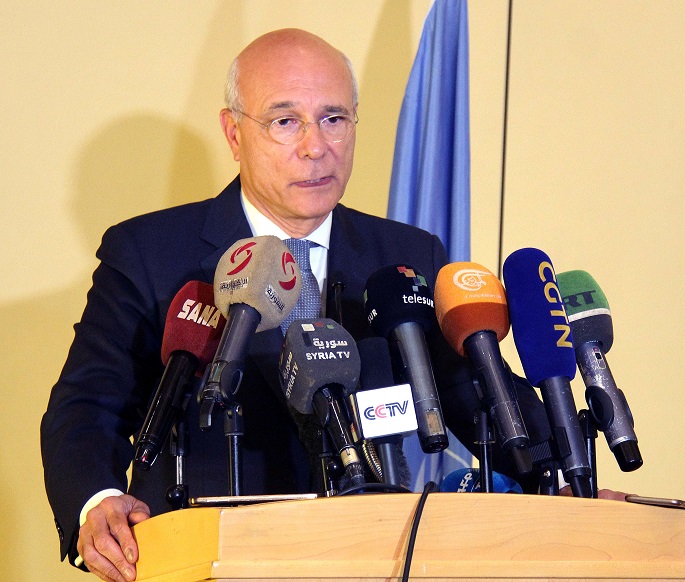Chemical weapons issue casts shadow over Syrian peace talks in Vienna
Published : 25 Jan 2018, 22:26

The Syrian talks in Vienna started on Thursday with an opening meeting between the government delegation and the UN special envoy to Syria Staffan de Mistura amid a new escalation over the issue of Syrian chemical weapons.
The government delegation to the Vienna talks, headed by Syria's UN permanent representative Bashar al-Jaafari, held a meeting with De Mistura, who said the fresh round of peace talks comes at a "critical moment," state news agency SANA reported.
In December, the last round of talks in Geneva ended without achieving any progress as the government and opposition delegations were unable to agree on the thorny issue of President Bashar al-Assad's role in the transitional period.
The fresh round of talks targets the constitutional issues in Syria between the warring parties, in preparation for the full implementation of the UN Security Council resolution 2254, an internationally-backed text that seeks UN-supervised elections in Syria.
On Jan. 18, De Mistura's deputy Ramzi Ezzedine Ramzi said during a visit to Damascus that the Syrian government had agreed to take part in the planned Syrian talks in Vienna, Austria.
Ramzi hoped for a positive engagement in the Vienna talks, linking the success of the Vienna talks with the success of the Sochi talks in Russia.
"We are looking forward to a constructive engagement from all Syrian sides whether from the government delegation or the opposition because without doubt, the success of the Vienna talks is the success of the Sochi talks," he said.
On Wednesday, French Foreign Minister Jean-Yves Le Drian said there was no sign of a political solution for Syria other than UN-led peace talks in Vienna, adding that they were the "last hope."
"Today, there is no political perspective that presents itself, other than the meeting that will be held in Vienna tomorrow under the auspices of the United Nations, where the belligerents will be present and where we hope a peace agenda will be mapped out," he said.
However, the Syrian government pins more hope on the upcoming Russian-backed Syrian talks scheduled to take place in Russia's resort city of Sochi later this month.
The Syrian Foreign Ministry said France and other Western powers are aiming to derail the upcoming Sochi talks by re-stirring the issue of Syrian chemical weapons.
On Tuesday, France announced it was sanctioning 25 people and companies over their alleged links to Syria's chemical weapons program, a day after activists claimed the Syrian forces used chlorine in an attack on the rebel-held Eastern Ghouta countryside of Damascus, causing 21 to suffer from breathing difficulties.
Meanwhile, U.S. Secretary of State Rex Tillerson charged that the Syrian government may still be using chemical weapons in its attacks, saying Russia, Syria's government key ally, bears the ultimate responsibility.
"Russia ultimately bears responsibility for the victims in Eastern Ghouta and countless other Syrians targeted with chemical weapons since Russia became involved in Syria," said Tillerson.
On Tuesday, France and the U.S., as well as 22 other countries, agreed on an initiative to work more closely to target those behind chemical weapons attacks and impose necessary sanctions.
Last November, Russia vetoed a U.S.-written resolution at the UN Security Council, which was designed to extend international investigation into the use of chemical weapons in Syria.
The U.S. accused the Syrian government of using chemical weapons in an attack on the rebel-held town of Khan Sheikhun in April of 2017 that allegedly killed 90 people.
The Syrian government, however, categorically denied the accusations, saying it is rebels in Khan Sheikhun that staged the attacks.
On Wednesday, the Russian Foreign Ministry said in a statement that Washington is trying to derail the objective investigation into the chemical attacks as it is not interested in identifying those who are truly responsible for the attacks.
France and the U.S. aim to complicate the Sochi talks, and this will completely halt the dialogue process in Syria since it doesn't suit the U.S. interest, the statement noted.
Also on Wednesday, the Syrian Foreign Ministry responded in a statement that the French and U.S. accusations are "part of the methodical policy against Syria."
Damascus has always been fully cooperative and provided all necessary to conduct an unbiased, objective and professional investigation into the use of chemical weapons, the ministry said.
The West aims to obstruct the investigation and exercise various types of pressure on investigation teams to politicize it because a transparent and objective investigation would not serve the West's agenda in Syria, it explained.

